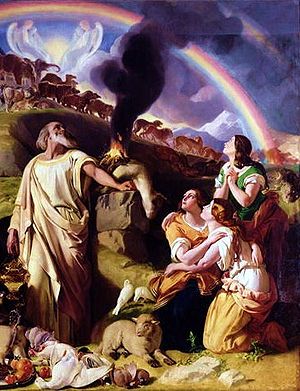 Image via Wikipedia
Image via WikipediaIn Genesis 9:20, Noah was drunk in his tent and uncovered, i.e. naked. When one son, Ham, saw his father's nakedness, he told the other two brothers about it. Told is the Hebrew word "nagad" (Strong's 5046) which implies denouncing someone. Ham was not at all concerned with preserving his father's honor or dignity, rather he delighted in being able to besmirch Noah's reputation. In contrast, the other two brothers took a garment and walked backwards to cover their father's nakedness.
When Noah learned what Ham had done, he cursed him with a generational curse. Noah then blessed the other two sons.
It would appear to be such an insignificant incident, except when one considers who Noah really was. Noah was the man who talked to God; who received instructions on how to build the ark; to whom God brought pairs of animals to be placed on the ark; for whom God closed the doors of the ark after everyone entered; with whom God made a covenant to never destroy the world by a flood again; to whom God gave permission to eat animals. Noah was an eminently important person at that time who was instrumental in saving a remnant of mankind from destruction in the Flood. Therefore, to disrespect Noah was in fact the same as dishonoring God because his relationship with God was so close.
Perhaps because Noah was so close to God, Noah perceived that Ham's shameful behaviour was an affront to God. His sons owed their very existence to God's mercy and still Ham chose to slam God. Perhaps Noah did not want to allow that kind of an attitude to become an accepted precedent.
In demonstrating his moral abandon and his disregard for God, Ham brought on himself a curse which would shape the destiny of his descendants. Since he spurned God then, his descendants would live without God's revelation.
By responding righteously, Shem glorified God and his relationship with him. Shem reflected God's blessing and so through subsequent genealogy, his line received God's revelation.
It is interesting that immediately following Noah's curse, Scripture addresses the origin of nations, i.e. the genealogies of the three brothers. In Shem's lineage, we see that he was the ancestor of all of the sons of Eber, the first Biblical reference to the people called Hebrews.
Though nations were scattered and new languages formed in the Tower of Babel incident, the driving force here seems to be to highlight the importance of Shem's genealogical line. God chose the righteous son of Noah to perpetuate the knowledge of God.
And again, another decisive point in God's choice of a specific line occurred when Terah, a descendant of Shem, decided to move away from Ur of the Chaldeans. Of Terah's two surviving sons, only Abram
chose to go with his father to another land.
While nothing in this account specifically addresses why Terah wanted to move, it's possible to speculate that his special relationship with God caused him to be uncomfortable in Ur. Abram chose to go with his father when it would have been much easier to remain where he no doubt, had other family members around him as well as a familiarity with the environment. However, he made a decision to move away with his father.
The decisions these Biblical figures made reflected their relationship to God. The better they knew him, the more they were able to trust him in making decisions to trust him; to take him at his word.

One of the earliest historical documents concerning the origin of Protobulgarians (the main tribe formed the Bulgarian nation) is The anonymous Latin Chronograph from 354 AD which says (pay attention on the last line):
ReplyDelete... From the first son of Noah – Shem, originated 25 peoples. They live in the east. The names of the sons of Shem are:
Elam, from whom are the Elamites;
Asyr, from whom are the Assyrians;
Arfaksad, from whom are the Chaldeans;
Lukh, from whom are the Lazes;
Kharam, from whom are the Igurians or Etkhes;
Lebul, from the are the Lydians;
Gatsera, from whom are the Gasfenians;
Khalmodat, from whom are the Indians;
Sala, from whom are the Bactrians;
Aram, from whom are the Arabs;
Iduram, from whom are the Gamerians;
Oderma; from whom are the Mardians;
Lezel, from whom are the Parthians;
Desmem, from whom are the Gedrusians;
Asal, from whom are the Khiskiians;
Asal raised Melkhi, who had two sons – Melkhi and Melkhisedek;
Avimelekh, from whom are the Hyrcanians;
Sabebi, from whom are the Arans;
Mamsvir, from whom are the Armenians or Amenians;
Evilat, from whom are the gymnosophists;
Ziezi, from whom are the Bulgars.